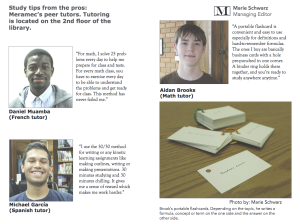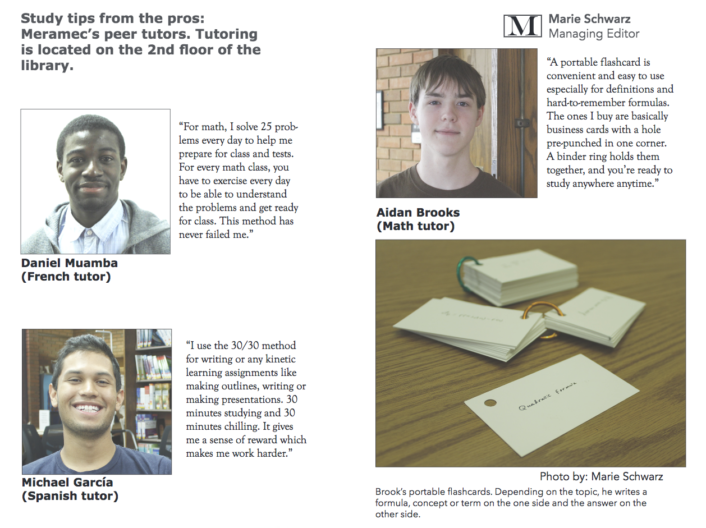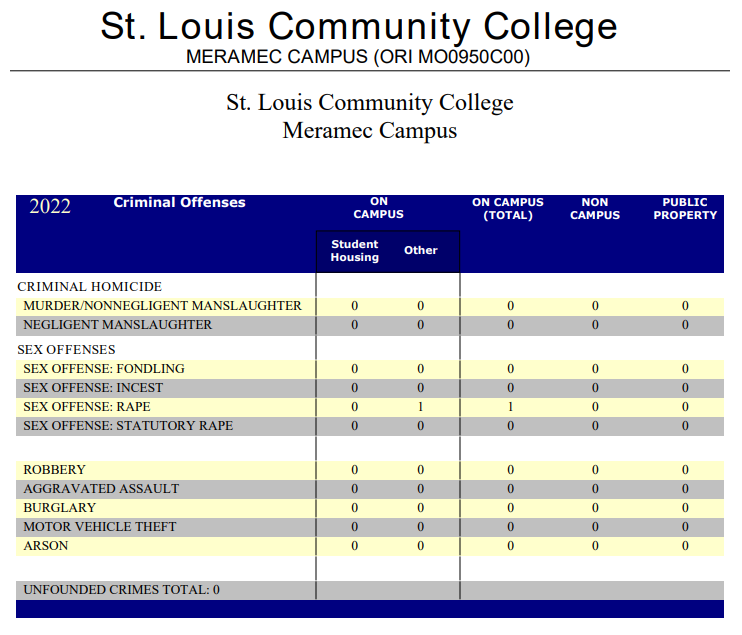
‘Sleep allows the mind and the body to rejuvenate’
College students need healthier sleep habits in order to achieve wellness
By: Caroline Frank
Staff Writer
Sleep affects every aspect of one’s physical and mental health, said Vicki Ritts, Ph.D., professor of psychology at St. Louis Community College – Meramec.
“Enough sleep makes a difference in our physical health – things like heart disease, high blood pressure, diabetes [and] the immune system,” Dr. Ritts said. “Sleep makes a difference in how much food we end up consuming or not consuming. It also impacts our mental health in terms of anxiety and depression. When we don’t have enough sleep, we’re also under a lot of stress.”
According to an online survey facilitated by the University of Georgia Health Center, the average college student gets 6-6.9 hours of sleep each night. Meramec student Scarlett O’shaughnessy said she gets about 6 hours of sleep per night, while Meramec student Haley Fields said she gets between seven and eight hours of sleep per night. These averages are below the amount Dr. Ritts recommended.
“It varies depending on the individual, and it also varies depending on the age category. But the traditional college-aged student needs between eight and 10 [hours of sleep],” Dr. Ritts said.
Dr. Ritts has made observations about some of the students in her classes.
“The problem is college students take on too much, so their sleep takes a hit. They try to take a full load and work 40 hours, and when you add that all up, there aren’t enough hours … so something suffers, and it’s usually sleep,” Dr. Ritts said. “It impacts our academic performance; our ability to focus is really sleep-dependent.”
Psychology disproves the common belief that one can “catch up” on sleep, Dr. Ritts said.
“You can’t catch up with your sleep debt. There are studies that show that it is best to have a consistent schedule. It’s hard for everybody, because it’s not like our lives are on a set schedule. But it really is best,” Dr. Ritts said.
Richard E. Cytowic, M.D., M.F.A., and Neurology Professor at George Washington University in Washington, D.C., wrote an article in Psychology Today called, “Sleep: The Clean-Up Crew of a Dirty Mind.”
“The brain parties every moment you are awake,” Cytowic said. “As [living cells] burn fuel they leave behind residue and toxic wastes—the equivalent of empty glasses, smelly ashtrays, and dirty dishes that a host must face when the action is over and things have died down.”
According to Cytowic, sleep allows the mind to rid itself of harmful properties and make room for the next day’s thought processes. The graph accompanying Cytowic’s article shows sleep as an active state that allows the brain to be productive.
Scientific studies show that levels of the harmful protein beta-amyloid rise during wakefulness and fall during sleep. Researchers believe the brain flushes out this pollutant using cerebrospinal fluid.
Jack S. Peltz, Ph.D., and Ronald D. Rogge, Ph.D., wrote an article in the academic journal Sleep Health called “The indirect effects of sleep hygiene and environmental factors on depressive symptoms in college students.” It said that college students face mental health concerns and sleep challenges, both of which are “intricately interrelated.”
Peltz and Rogge wrote about a survey conducted in 2015 that comprised of 335 college students at an average age of 19.9 years.
Of those students, approximately 30 percent of them reported having symptoms of depression, and 60 percent of them reported having sleeping problems.
“Fundamental to college students’ sleep are both their sleep environment and their sleep hygiene practices,” Peltz and Rogge wrote.
According to the article, one’s sleep environment factors into the type of sleep a person will get. Sleep environment includes external noises, room temperature, the proximity of electronics and the presence or absence of a roommate.
Another factor is sleep hygiene, which is defined by the behavior that positively influences sleep. The article said this includes excessive activity of any kind before bedtime, daytime naps, what foods and drinks were consumed and when, emotional upset before falling asleep and the brightness of a room or electronic device.
“Sleep hygiene practices suggest abstaining from pre-bedtime media use due to the alerting characteristics of screen light,” Peltz and Rogge wrote.
In the survey, students who reported high levels of sleep disturbance and depressive symptoms also endorsed higher levels of anxiety and poorer cognitive and physical functioning.
The results concluded that “sleep hygiene and environmental factors may be potential avenues for preventing depressive symptoms in college students.”
“Healthy Sleep Habits” by the American Academy of Sleep Medicine says to limit the amount of solid and liquid intake right before bed; exercise, follow a healthy diet during waking hours and “use your bed only for sleep and sex.”
Shelby Harris, Psy.D., P.C., is a specialist in behavioral sleep medicine and cognitive behavior therapy practicing in Hartsdale, New York. Harris suggests turning down the lights an hour or so before bed and unplugging from technology to signal to the body it’s time to retreat.
“A lot of people watch TV in bed or pay their bills or even do their taxes, and then wonder why their minds continue to race when they want to go to sleep,” Harris said. “We encourage people to make their bedroom a sanctuary for sleep.”
The National Sleep Foundation recommends maintaining a clean room, having a supportive mattress and pillow, setting a sleep schedule, performing a relaxing bedtime ritual, avoiding naps during the day and sleeping in a dark, quiet room at night between 60 and 67 degrees.
June J. Pilcher, Ph.D., Douglas R. Ginter, and Brigitte Sadowsky from the Department of Psychology at Bradley University in Peoria, Illinois, wrote an article in the Journal of Psychosomatic Research called “Sleep quality versus sleep quantity.” They conducted a survey to test the impact sleep has on the lives of college students, and whether the duration of sleep or the type of sleep matters more. The findings were that sleep quality had as much of an impact on the subjects as sleep quantity, and healthcare professionals should understand the equal importance of both.
In order for college students to get the right kind of sleep as well as the right amount of sleep, psychologists say they must follow healthy sleeping habits.
Adapting healthy sleeping habits will ensure a higher level of wellness, Dr. Ritts said.
“For me, wellness encompasses both physical health and mental health, and you really can’t separate those two out — ever,” Dr. Ritts said. “Sleep allows the mind and the body to rejuvenate.”
By: Daphne Drohobyczer
Staff Writer
Mental Health is important during midterms and finals or even the holidays, said Jason Duchinsky, Mental Health Counselor at St. Louis Community College — Meramec.
“Whether you need help with planning and time management, depression, or want to express a personal issue [confidentially], the counselors are here to help alleviate some of the stress that comes along with the holidays, pressure from parents, or any type of mental health stressors,” Duchinsky said.
Duchinsky said counseling can be potentially very powerfully therapeutic.
“Stressed students like ‘being heard, feeling felt, being understood,’” Duchinsky said.
“It’s powerful to know that you’re not alone and that there are people just like you.” Duchinsky said a counselor trying to help out a student does not always know what the outcome is because the student has to put in the effort too, and listen to what the counselor is saying.
“Growth requires effort, it requires work,” Duchinsky said.
“We don’t always have the answer for students in his or her process of finding those answers or making decisions. [But] it is reasonable to expect that the student would be able to cope better with the difficulty [after a visit at the counselor’s office].”
Students should initiate assessing themselves, acknowledge their limitations, and being more comfortable with admitting to themselves that shortcomings happen, Duchinsky said.
Students cannot take on everything, he said.
Tyler Fuson, a sophomore at Meramec, has his own way to decompress.
“What I like to do … is the Pomodoro Technique … where I do a certain number of problems, maybe ten, take a fifteen minute break, and then go back to my homework, that way it makes it a little more relaxed,” Fuson said.
Meramec student Tim Donermeyer said that the internet and going to Blues Hockey and Cardinals games helps him to relax and destress from studying.
“I usually hop online and either read stories or watch Youtube videos,” Donermeyer said.
Students who need help with stress management can find the counseling office on the second floor of the Communication North building.
“If you don’t make time, you will not have time,” Duchinsky said.
Healthy foods on the go
Finding that healthy balance in a student’s diet
By: DJ McGuire
Sports Editor
As long as students focus on moderation in their diet, a healthy lifestyle is easily attainable, said Jason Allen, Ph.D., full-time Biology professor at Meramec.
He said his motto is “everything in moderation.” In order to maintain a healthy lifestyle several specific foods and food groups like fresh fruits and vegetables, such as broccoli, apples, and oranges are healthy, Allen said.
Sophomore student Emma Fraley enjoys eating a banana, or chopping up a tomato and eating that in a rush.
“I like to throw together a small salad or eating yogurt, which is fast and portable,” Fraley said.
Student Pat Ryan, who visits the cafeteria occasionally, said he eats foods like bananas, oranges, carrots and celery sticks when he is in a rush.
“These foods are great options to eat on the go,” Ryan said.
Allen understands the busyness of college life, as he also leads a very busy life as well, he said.
A busy life leads students to eat and grab foods that focus on speed, not on its nutritional value, Allen said.
“Things that are fast for us aren’t necessarily good for us”, Allen said.
“These foods are filled with high amounts of processed sugars, trans fats and high fructose corn syrup. Try to avoid these kinds of foods. Avoid drinks such as soft drinks and energy drinks.” Allen combats the fast food problem by preparing food in advance, he said.
“I cook several meals in one day… for the week. If a student spends one day cooking several meals that will last them a week, eating healthier in a rush becomes much simpler,” Allen said.
Allen said chicken and turkey with just a little bit of seasonings are good choices for meals.
“Fish can also be a very healthy option, although watch out for its country of origin and mercury content,” Allen said.
If students are looking for a quick snack rather than a full meal, plenty of healthy options are out there, Allen said.
“Nuts are a great example,” Allen said.
“For example, walnuts, peanuts and cashews provide high levels of protein.
Granola bars can be a good option too, just some are much healthier than others.” Sophomore Nick Keeton said he is a fan of almonds.
“They are really high in mono and saturated fats,” Keeton said.
Keeton said he also likes to eat fruits, such as apples and mangoes.
Many students like to take the option of eating fast food for some of their meals, Allen said, but some options in fast food restaurants are healthier than others.
“Arby’s Artesian Turkey is a very healthy option, as well as Subway and McDonalds’s salads,” Allen said.
While fast food may not be the healthiest option for students, eating it occasionally will not harm students drastically, Allen said.
Allen said one great supplement to a healthy diet are multivitamins.
“A good multivitamin every day is worth its weight in salt,” Allen said.
Vitamins can help bolster important nutrients every college student should focus on vitamin K, C, D and E and the Omegas, Allen said.
“Finding the importance of a healthy diet and some sort of physical activity leads to a much healthier lifestyle”, Keeton said.












